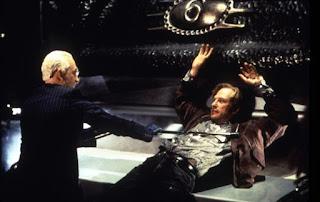 There was a time where Stephen King's every coke-fueled brain fart inspired a movie. His serviceable short story "The Mangler" was originally optioned as part of an anthology film, before it was expanded into a feature in 1995. The result is one of the most bizarre, ill-conceived horror movies ever made...more's the pity that for all that, it's not remotely enjoyable.
There was a time where Stephen King's every coke-fueled brain fart inspired a movie. His serviceable short story "The Mangler" was originally optioned as part of an anthology film, before it was expanded into a feature in 1995. The result is one of the most bizarre, ill-conceived horror movies ever made...more's the pity that for all that, it's not remotely enjoyable. A small Maine town's economy seems to revolve around an ancient laundry factory, overseen by the insane Mr. Gartley (Robert Englund). A gruesome accident leads Police Officer John Hunton (Ted Levine) to suspect something more is amiss that industrial irresponsibility. His demonologist brother-in-law (Daniel Matmor) becomes persuaded that the factory's massive laundry press has somehow become demonically possessed. A notion Hunton scoffs at, until he sees one accident too many...and learns that Gartley runs a satanic cult that regularly sacrifices teenage girls to the Mangler. Including, it appears, his own niece Sherry (Vanessa Pike).
Let's face facts: The Mangler is a bad idea from conception. King's story (collected in his book Night Shift) is a slight, spooky tale of technology run amok, with some stomach-churning images of maimed limbs and dismembered corpses, an unsubtle message about the importance of workplace safety and an ending that's both silly and horrifying at the same time. At 30-odd pages, it's fine; but there's barely enough plot - heck, barely enough concept - for an Outer Limits segment, let alone a 90 minute movie. Perhaps the only way to make it work was to go the parody route, and the movie's so over-the-top at points that it comes close. But amazingly, The Mangler wants us to take its fundamental premise seriously.
Director Tobe Hooper (a long way from Texas Chainsaw Massacre) and screenwriter Harry Alan Towers sure try to make the film some kind of commentary on capitalist exploitation. Besides the cavernous, virtually sun-free factory straight out of Dickens, Gartley is a shambling, cackling embodiment of avarice. Besides his hideous, near-cyborg appearance caused by his own run-in with the Mangler, he laughs at employee injuries and harasses the women working for him, while using his power to shield his company from investigation. A man after Peter Thiel's heart, Gartley relishes the power that comes with his demonic pact, viewing the death of a few girls and the occasional employee as a grim necessity. Hunton is constantly frustrated in his efforts, first to expose the truth, then to break the curse, culminating in a bleak ending that suggests the cycle of exploitation will continue unbroken.
All well and good; horror fans know that even the sleaziest exploitation films can hide thematic riches and cultural anxieties. But The Mangler simply can't overcome its absurdity with these half-baked delusions of grandeur. Hooper's berserk direction - all canted angles, tracking shots, showers of steam and puddles of gore - only hammers home the disconnect. Undemanding horror fans might enjoy the hysterically gruesome murders, and it's hard to deny the camp value of John smashing a demonically-possessed icebox with a hammer, Gartley cavorting about on robotic legs or the comically bad effects when the Mangler breaks free and runs wild. Still, any fun here is incidental (and accidental); most of Mangler is a dreary, dopey bore.
There's no human investment in this monstrosity, either, with its slumming stars supported by South African performers mangling American accents. Ted Levine manages to seem bored while overacting, an intriguing feat, but he's Edwin Booth next to Robert Englund. The erstwhile Freddie Krueger relishes his despicable character, a collection of robotic body parts, manic tics and perverted cackles as he celebrates the deaths of his employees. At least someone in this mess is having fun.
The Mangler has a cult following among those who appreciate its utter outlandishness. And let's be fair, King's work has inspired so many terrible movies (from Graveyard Shift to Maximum Overdrive and a dozen variations on Children of the Corn) that it's hard to brand this "the worst." But The Mangler might well be the stupidest and misguided of them all; part pulp nonsense, part pretentious B Movie, it amazingly fails to entertain on any level.

